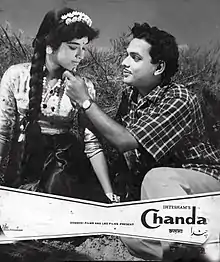| Chanda | |
|---|---|
 Poster | |
| چندا | |
| Directed by | Ehtesham |
| Written by | Story & Screenplay: Ehtesham Dialogue: Suroor Barabankvi |
| Produced by | FA Dosani |
| Starring | |
| Cinematography | MQ Zaman |
| Music by | Robin Ghosh |
Production company | |
| Distributed by |
|
Release date |
|
| Country | Pakistan |
| Language | Urdu |
Chanda is a Pakistani Urdu-language film that was released on 3 August 1962 in Pakistan. It stars Rehman and Sultana Zaman in lead roles. It is the first Urdu-language film to be produced in East Pakistan (now Bangladesh).[1] It was also Shabnam's Urdu-language film debut.[2]
Cast
Music
| Chanda | |
|---|---|
| Soundtrack album by | |
| Released | 1962 |
| Genre | Folk music |
| Language | Urdu |
| Producer | Robin Ghosh |
| No. | Title | Lyrics | Singers | Length |
|---|---|---|---|---|
| 1. | "Akhian Tori Rah Niharen, O Pardesia, Aa Ja.." | Suroor Barabankvi | Ferdausi Rahman | |
| 2. | "Chandni, Bheegi Bheegi Hawa, Na Janay, Dil Kahan Kho Geya.." | Suroor Barabankvi | Anjuman Ara Begum | |
| 3. | "Chhalkay Gagria, Bheegay Chunaria, Aisay Na Dekho, Sanwaria.." | Suroor Barabankvi | Ferdausi Rahman, Farida Yasmin | |
| 4. | "Lut Geya Khushion Ka Dera, Kho Geya, Hey Pyar Mera.." | Suroor Barabankvi | Ferdausi Rahman | |
| 5. | "Mout Ki Hay Pukar, Deep Bujha Do.." | Suroor Barabankvi | Ferdausi Rahman, Najmul Huda | |
| 6. | "Naino Say Ghoonghat Koi Laye, Nazar Sharmaye.." | Suroor Barabankvi | ||
| 7. | "Rang Roop, Jawani, Rut Sawan Ki Suhani.." | Suroor Barabankvi | Ferdausi Rahman, Farida Yasmin | |
| 8. | "Sanbhal Kay O Albeli, Kahan Chali Hay Akeli.." | Suroor Barabankvi | Akhtar Abbas, Anjuman Ara Begum | |
| 9. | "Sayyan, Bedardi Mora, Dard Na Janay Ray.." | Suroor Barabankvi | Farida Yasmin |
Release
Chanda was released on 3 August 1962, six years of the release of Mukh O Mukhosh, the first feature film of East Pakistan. J.C. Anand distributed the film in Punjab and North-West Frontier Province through his distribution company Eveready Pictures. Anis Dosani arranged to distribute the film in other provinces and territories of Pakistan on a commission basis. Chanda was shown in movie theatres for 25 weeks.[4]
Reception
Chanda was a commercial success in Pakistan and became a hit. According to Anupam Hayat, the film ushered in a new era in Pakistan.[5] It changed the fate of Dhallywood positively.[6] Film director Azizur Rahman criticized the poster of the film. He said the film's main theme is not presented in the poster.[7]
Bengali filmmaker Alamgir Kabir said about Chanda in 1969:
The industry was fast heading for a disaster when a director dared to go a little bit further and made an Urdu language film. The film was Chanda (1962) directed by Etesham. It proved a money-spinner in both East and West Pakistan. Chanda's performance naturally encouraged a trend of Urdu filmmaking in East Pakistan.[8]
Accolades
| Award Title | Category | Awardee | Result | Ref |
|---|---|---|---|---|
| 6th Nigar Awards | Best film | Ehtesham | Won | |
| Best supporting actress | Shabnam | Won | [9] | |
| Best comedian | Subhash Dutta | Won |
References
Citation
- ↑ "Chanda (1962 film)". Pakistan Film Magazine website. Archived from the original on 1 July 2017. Retrieved 15 December 2022.
- ↑ Sadya Afreen Mallick (30 September 2012). "Shabnam: Memorable moments in the life of an actress". The Daily Star. Archived from the original on 27 July 2022. Retrieved 27 July 2022.
- ↑ "রানী সরকারকে শেষ শ্রদ্ধা নিবেদন". Manab Zamin (in Bengali). 7 July 2018. Archived from the original on 27 July 2022. Retrieved 27 July 2022.
- ↑ Noorani, Asif; Arshad, Sultaan (11 December 2016). "The Way We Were". Dawn. Archived from the original on 4 July 2019. Retrieved 27 July 2022.
- ↑ Hayat, Anupam (17 December 2021). "লোকজ কাহিনি থেকে জনপ্রিয় উর্দু ধারার দিকে যাত্রা". Ajker Patrika (in Bengali). Retrieved 27 July 2022.
- ↑ Zakir Hossain Raju (2017). Bangladesh Cinema and National Identity: In Search of the Modern?. Routledge. p. 84. ISBN 9780815392200. Archived from the original on 27 July 2022. Retrieved 27 July 2022.
- ↑ Shafiq, Saleh (28 February 2022). যেভাবে পোস্টার হলো বাংলা ছবির মেন্যু কার্ড. The Business Standard (in Bengali). Archived from the original on 9 March 2022. Retrieved 27 July 2022.
- ↑ Alamgir Kabir (1969). The cinema of Pakistan. Dhaka: Sandhani Publications. p. 44.
- ↑ The Phrenological Journal and Miscellany, Volume 10. Palala Press. 2015. p. 69. Archived from the original on 27 July 2022. Retrieved 27 July 2022.
Bibliography
- Hoek, Lotte (5 January 2015). "Cross-wing Filmmaking: East Pakistani Urdu Films and Their Traces in the Bangladesh Film Archive". BioScope: South Asian Screen Studies. SAGE Publishing. 5 (2): 99–118. doi:10.1177/0974927614547989. S2CID 154148790.